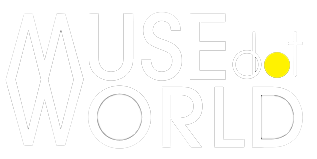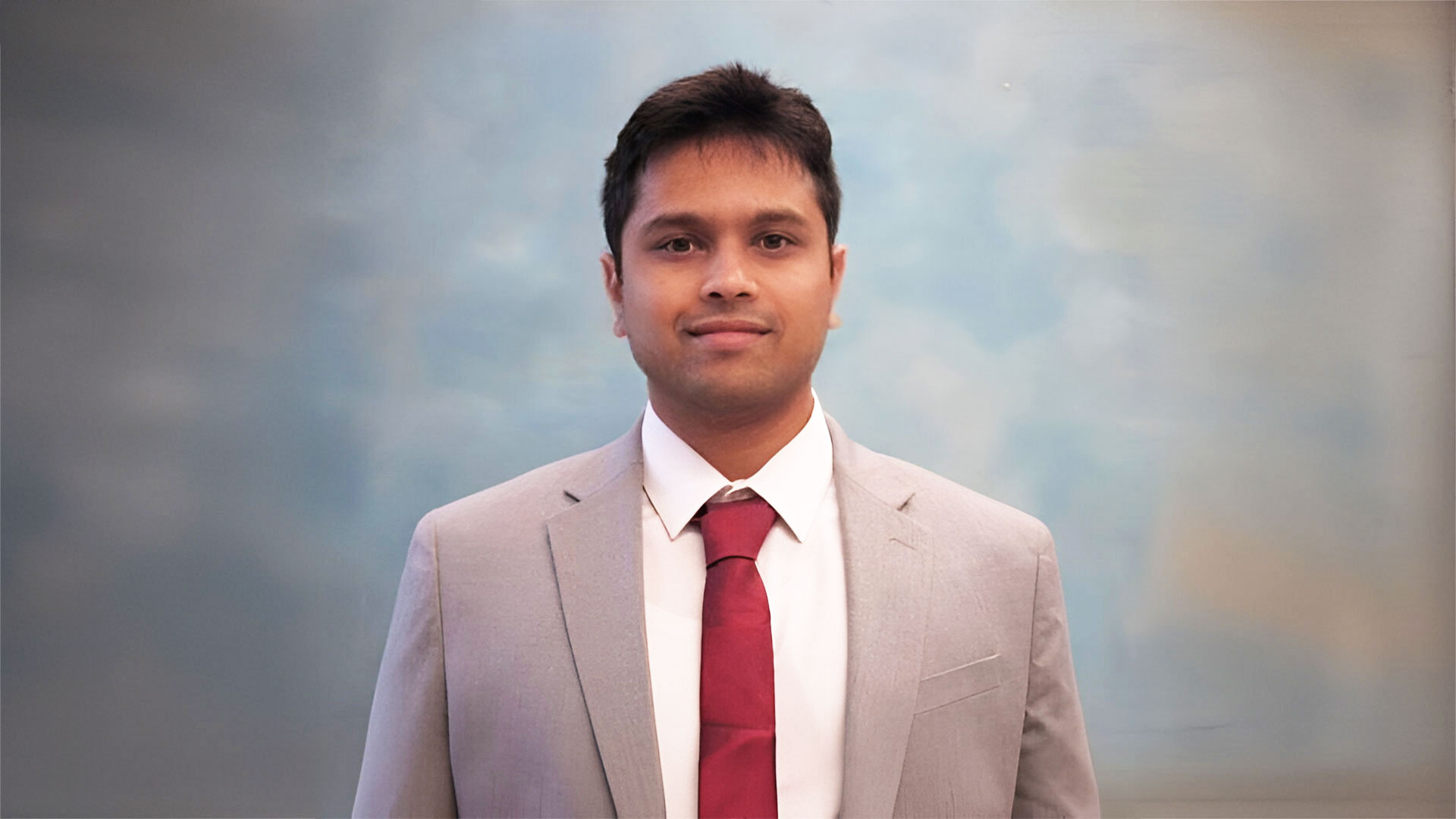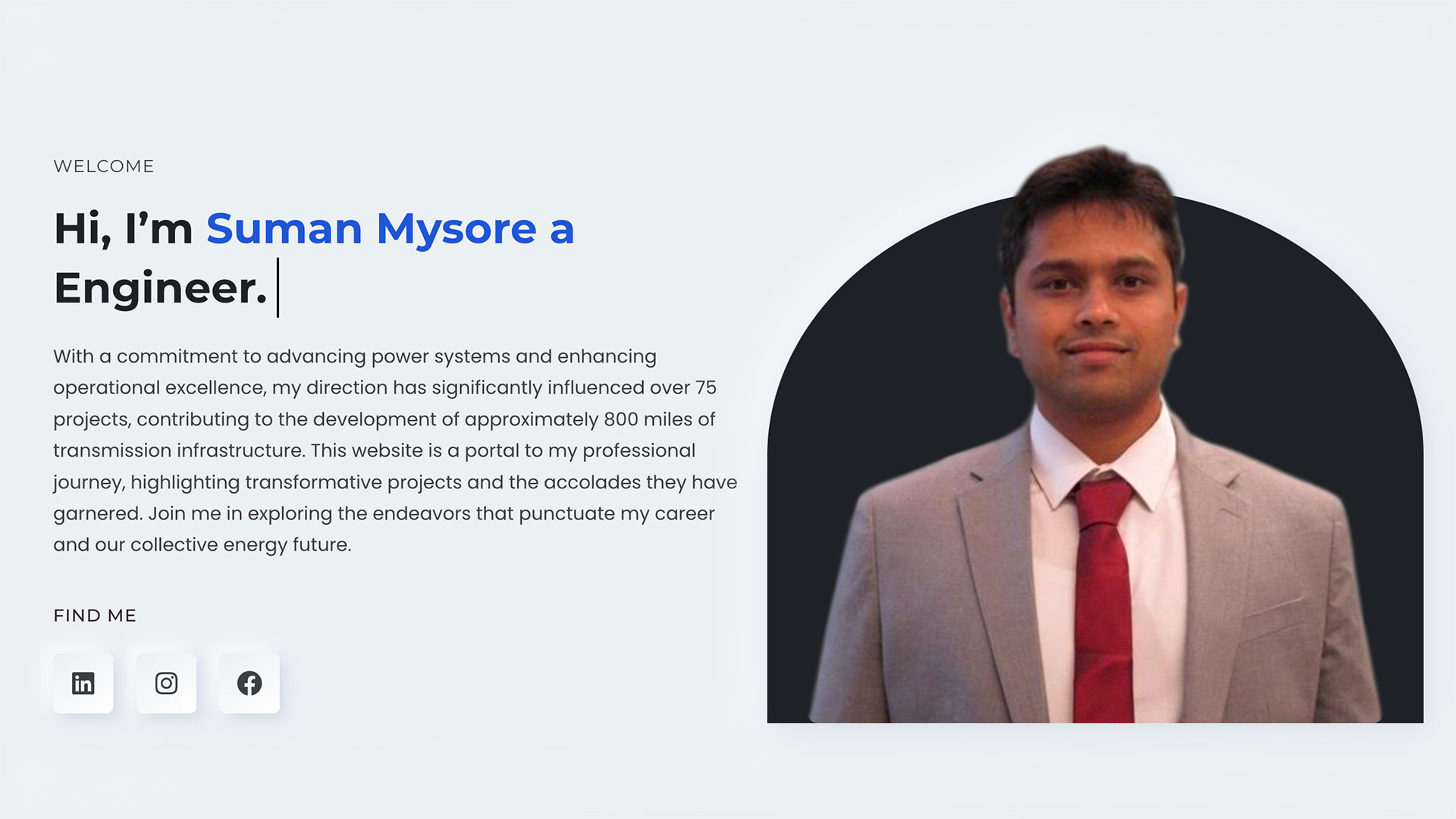Interview with Suman Mysore from the United States

Interview with Vatesh Pasrija from the United States
July 11, 2024
Interview with Damodaran Chingleput Sathyakumar from the United States
July 11, 2024I am Suman Mysore, a Senior Engineer and Global Lead of Transmission Line Projects with extensive expertise in designing and executing complex projects focused on enhancing grid reliability and resilience.
With a Master’s degree in Structural Engineering from North Carolina State University and a Bachelor’s degree in Civil Engineering from Bangalore Institute of Technology, my career spans over a decade during which I've successfully managed over 75 projects.
My skills in PLS CADD, project risk management, and client relationship management have significantly contributed to both operational excellence and revenue growth. I hold Professional Engineer licenses in Texas and North Carolina and am a certified Project Management Professional.
As a senior member of the Institute of Electrical and Electronics Engineers (IEEE), I am committed to advancing the field of power energy and systems.
In my current role, I lead initiatives to enhance grid reliability and resilience, focusing on aspects such as load forecasting, infrastructure upgrades, and the integration of renewable energy sources.
My responsibilities encompass conducting technical reviews, mentoring junior engineers, and managing day-to-day project operations to ensure timely and quality completions. I also play a pivotal role in developing client relationships and expanding our market reach by identifying new business opportunities and driving innovations in transmission engineering projects.
This multifaceted role allows me to leverage my extensive knowledge in the industry and project management to enhance our operational efficiency and contribute significantly to our revenue growth.
Burns & McDonnell Engineering Company Inc. is an employee-owned firm that provides engineering, architecture, construction, environmental, and consulting services.
The company has consistently ranked #1 among the Power and Transmission & Distribution companies for eight consecutive years and is recognized as one of Fortune's 100 best corporations. With a workforce exceeding 14,500 employees and an annual revenue surpassing $7 billion, Burns & McDonnell's operational excellence is reflected in its management of multifaceted projects across critical sectors, emphasizing its pivotal role as a distinguished organization in the infrastructural backbone of numerous communities.
The company has garnered numerous accolades within the industry, highlighting its reputation as a premier employer and a leader in sustainable practices. Furthermore, its collaborations with industry leaders across various sectors accentuate Burns & McDonnell's trusted and respected position within the engineering community.
Burns & McDonnell is a private engineering, architecture, construction, environmental and consulting firm that is specialized in the planning, design, and construction of infrastructure projects across various industries. Here are some key characteristics of the company:
1. Industry Focus: While Burns & McDonnell provides services to multiple industries, it has a strong focus on the following sectors:
- Power generation: The company has extensive experience in the design and construction of power plants, including fossil fuel, nuclear, and renewable energy projects.
- Transmission & distribution: Burns & McDonnell offers services related to the planning, design, and construction of electrical transmission and distribution systems.
- Aviation: The firm provides services for airport planning, design, and construction projects.
- Environmental Services: Burns & McDonnell offers environmental consulting, compliance, and remediation services.
- Manufacturing: The company assists with the design and construction of manufacturing facilities.
2. Employee-owned: Burns & McDonnell is an employee-owned firm, which means that it is owned and controlled by its employees through an employee stock ownership plan (ESOP). This ownership structure is believed to foster a strong commitment to clients and a collaborative work environment.
3. Comprehensive Services: The company offers a wide range of services, including engineering, architecture, construction, environmental consulting, and project management. This integrated approach allows Burns & McDonnell to provide comprehensive solutions to its clients.
4. Global Presence: While headquartered in Kansas City, Missouri, Burns & McDonnell has regional offices throughout the United States and international locations in Canada, Mexico, the United Kingdom, and India, serving clients worldwide.
5. Sustainability Focus: The firm has a strong commitment to sustainable design and construction practices, aiming to incorporate environmentally responsible solutions into its projects.
6. Long History and Reputation: Founded in 1898, Burns & McDonnell has a long history and a well-established reputation in the engineering and construction industry, having worked on numerous high-profile projects over the decades.
Overall, Burns & McDonnell is a large, employee-owned firm that specializes in providing integrated engineering, architecture, construction, and environmental services, with a strong focus on infrastructure projects across various industries, particularly in the power, aviation, and environmental sectors.
Winning the TITAN Business Awards is a significant milestone in my career. This recognition validates my dedication to engineering excellence, innovation, and sustainable project management. It highlights my role in advancing industry standards and contributing effectively to our field through complex project executions and innovative solutions.
Personally, this award is not just an honor but also an encouragement to continue striving for excellence, pushing the boundaries of engineering practices, and pursuing advancements that can benefit both our infrastructure and the broader community. It reinforces my commitment to maintaining high standards in every aspect of my work and inspires me to keep enhancing my skills and knowledge in the ever-evolving engineering landscape.
My definition of a successful team or business hinges on several core principles:
Clear Vision and Goals: A successful team or business has a clear, articulated vision and specific, measurable goals. This direction guides all decisions and actions, providing a sense of purpose and a benchmark for success. Effective Communication: Open and transparent communication is vital. This means not only ensuring that messages are conveyed clearly and effectively but also fostering an environment where feedback and constructive criticism are encouraged. This promotes understanding and alignment among team members. Collaboration and Cohesion: Teams that work closely together, sharing knowledge and resources, tend to be more innovative and efficient. A successful team or business values collaboration over competition among its members, creating a cohesive unit that functions synergistically. Adaptability: The ability to adapt to changing market conditions, customer needs, and technological advancements is crucial. A successful business remains flexible, adjusting its strategies and processes in response to external pressures and opportunities. Strong Leadership: Effective leadership steers the team towards its goals while maintaining morale and motivation. Leaders in successful teams or businesses are not just commanders; they are mentors and facilitators who empower their members to take initiative and lead in their own right. Customer-Centric Approach: Success often depends on how well a business can meet the needs of its customers. A successful business anticipates customer needs and works diligently to provide high-quality, innovative solutions that deliver real value. Ethical Practices and Integrity: Maintaining high ethical standards and operating with integrity builds trust with customers, employees, and stakeholders. This trust is fundamental to long-term success as it fosters loyalty and a positive reputation. Results-Oriented: While process is important, outcomes are the ultimate measure of success. A successful team or business consistently meets or exceeds its performance targets and achieves its strategic objectives.Incorporating these elements fosters a productive, innovative, and resilient organizational culture that can navigate challenges and seize opportunities effectively.
My success in the engineering industry, particularly in transmission engineering, is attributed to a blend of educational grounding and a commitment to continuous learning, which have kept me at the forefront of technological advancements and industry standards.
The extensive hands-on experience I've accumulated through progressively challenging projects has sharpened my skills in design, project management, and problem-solving. Mentorship has offered valuable insights, while robust professional networking has opened doors to collaborative opportunities and projects essential for my growth.
My adaptability and problem-solving capabilities have enabled me to effectively address unforeseen challenges, maintaining project integrity under varying conditions. Leadership skills and effective team collaboration have been pivotal in managing projects and inspiring team members to achieve optimal outcomes.
Above all, a deep-rooted passion for engineering and a steadfast commitment to making impactful contributions to the field have fueled my continuous drive to innovate and excel, sustaining my career's momentum and effectiveness in this dynamic industry.
The United States, where I am based, has played a significant role in advancing the engineering industry, particularly in areas such as transmission engineering and renewable energy integration.
The country's commitment to innovation is evident in its robust support for research and development, which is backed by both government funding and private investment. This environment fosters technological advancements and the application of new technologies in practical, field-ready applications.
Moreover, the U.S. has a well-established regulatory framework that promotes safety, efficiency, and environmental sustainability, which drives continuous improvement in engineering practices. The emphasis on sustainable and green technologies has particularly propelled the industry forward, aligning with global trends towards reducing carbon footprints and enhancing energy efficiency.
Educational institutions in the U.S. are also at the forefront of engineering education, producing a workforce that is skilled, innovative, and ready to meet the challenges of modern engineering tasks. These institutions often collaborate with industry through research projects and internships, creating a productive cycle of innovation and practical application.
Additionally, the U.S. market's openness to global collaboration allows it to integrate diverse technological innovations and engineering practices from around the world, further enhancing its industry's capabilities and leading to advancements in infrastructure projects that are both influential and globally recognized.
In the business industry, particularly within the engineering sector where my focus lies, several current trends are particularly exciting:
Sustainability and Green Engineering: There's a growing emphasis on sustainable practices and the development of green technologies. This trend is driven by global needs to reduce carbon emissions and minimize environmental impacts, leading to innovations in renewable energy sources, sustainable materials, and eco-friendly project designs. Digital Transformation and Automation: The integration of digital technology into every area of engineering is transforming how projects are designed, simulated, and executed. Automation and AI are streamlining processes, from automated design tools like PLS-CADD in transmission engineering to AI-driven predictive maintenance for infrastructure, enhancing accuracy and efficiency. Smart Infrastructure and IoT: The Internet of Things (IoT) is revolutionizing infrastructure management, with smart sensors and devices enabling real-time monitoring and management of engineering structures. This trend is leading to smarter cities and improved grid resilience, which are critical in today’s rapidly urbanizing society. Advanced Data Analytics: Big data and advanced analytics are becoming crucial in decision-making processes. They allow for more precise risk assessment, project management, and resource allocation, which are vital in managing complex engineering projects and ensuring they meet their timeframes and budget targets. Decentralization of Energy Systems: The move towards decentralized energy systems, including microgrids and distributed energy resources, reflects a shift in how energy is generated, stored, and used. This decentralization not only enhances grid resilience but also empowers communities by making them less reliant on large-scale power grids. These trends are reshaping the engineering landscape, offering new opportunities for innovation and efficiency improvements that excite me both as a professional and a contributor to the field's advancement.To improve business prospects and organizational success, I recommend considering a leveraging a mix of educational resources and practical tools. I would also recommend engaging with books like Good to Great by Jim Collins for insights on elevating company's performance, and using platforms like LinkedIn Learning and Coursera for skill development in areas like management and digital marketing.
Regularly attending industry conferences and engaging with professional networks can provide valuable new insights and connections. Additionally, incorporating technology solutions such as CRM software and business intelligence tools can streamline operations and enhance decision-making processes.
In the next 5-10 years, I see the evolution of the overall business industry being significantly influenced by a few key trends. First, digital transformation will continue to be a major driver, with businesses integrating advanced technologies like AI, machine learning, and IoT more deeply into their operations.
This will enhance efficiency, personalize customer experiences, and open new avenues for innovation. Additionally, sustainability will move from being a niche interest to a core component of business strategies, as companies increasingly prioritize environmental impact and social responsibility in response to consumer demand and regulatory pressures.
Lastly, the rise of remote and flexible work arrangements will likely reshape organizational structures and corporate cultures, leading to changes in how companies recruit, manage, and retain talent. These shifts will require businesses to be agile, forward-thinking, and increasingly reliant on data-driven decision-making.
In my life, I have been greatly inspired by Nambi Narayanan, a distinguished Indian aerospace engineer and scientist. His work on developing the Vikas engine which propelled India's space exploration program forward is nothing short of remarkable.
Despite facing tremendous personal and professional adversities, including being falsely charged with espionage, Narayanan's resilience and steadfast dedication to his field greatly influence how I approach my career and life challenges.
His story is a powerful reminder of the impact of perseverance and integrity, encouraging me to pursue my goals with unwavering commitment and a strong moral compass. His eventual vindication and ongoing contributions to science and engineering highlight the importance of resilience and the pursuit of truth and justice, no matter the obstacles.
My key to success revolves around continuous learning, resilience, and adaptability. Keeping abreast of the latest technological advancements and industry shifts is vital in engineering, making ongoing education through formal and experiential learning crucial.
Resilience is equally important, allowing me to view setbacks not just as obstacles, but as opportunities to grow and refine my approach. Adaptability enables me to respond effectively to changes, maintaining my relevance and effectiveness in a dynamic field.
Moreover, I firmly believe in being part of the process and not just focused on the outcome. This philosophy encourages active engagement in the journey, appreciating each step, and learning from the entire experience rather than just celebrating the end results.
Parting words of wisdom: Embrace every challenge as a stepping stone, maintain a curious and learning-oriented mindset, and remember that the path to success is as valuable as the achievements themselves. Success is not just reaching a destination but growing through the journey itself.
Suman Mysore
Suman Mysore is a Senior Engineer and Global Lead of Transmission Line Projects at Burns & McDonnell Engineering Company Inc., with extensive expertise in designing and executing complex projects aimed at enhancing grid reliability and resilience.
Read more about this interview with Sathishkumar Chintala from the United States, the Gold Winner of the 2024 TITAN Business Awards.


